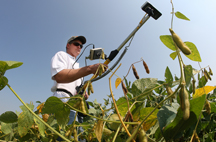Purdue Ag to receive major funding for plant sciences
September 12, 2013
 |
|
Ben Hall, a Purdue graduate student in agronomy, collects leaf reflectance data in a soybean field at Purdue's Agronomy Center for Research and Education. Hall was collecting data to determine variation in nitrogen content in the plants' leaves. Sensor technology has proven to be a precise and efficient method for phenotyping breeding populations. (Purdue Agricultural Communication photo/Tom Campbell) |
WEST LAFAYETTE, Ind. - Purdue's College of Agriculture will receive more than $20 million in university funding for plant sciences research and education to strengthen Purdue's leadership in developing new and novel ways to help feed a rapidly growing world population.
The plant sciences initiative, announced by President Mitch Daniels on Thursday (Sept. 12) during a President's Forum, is among 10 targeted programs designed to enhance research and educational opportunities for students and broaden Purdue's global impact.
"One of the critical questions we face is how to feed a growing world population," Daniels said. "This initiative can lead to answers to that question by helping to produce plants that have higher yields and can grow in a variety of environmental conditions."
The College of Agriculture plans to add 10 new faculty positions, some new facilities and remodeling of existing facilities, and programmatic support for research and student recruitment and education.
The investment will dramatically expand Purdue's capabilities in plant sciences, helping the university to move discoveries from the laboratory to commercialization or to the farm in innovative ways, said Jay Akridge, Glenn W. Sample Dean of Agriculture.
"In addition, we will be embedding educational opportunities for students throughout this process of discovery and innovation, creating a unique learning opportunity for the next generation of leaders in the plant sciences," Akridge said.
Gebisa Ejeta, distinguished professor of agronomy and 2009 World Food Prize laureate, said the funding reflects Purdue's leadership role in working to find ways to feed a world population expected to increase from about 7 billion now to 9 billion by 2050.
"Science, technology and innovation are key to feeding humanity sustainably," Ejeta said. "With this investment, Purdue University is making a commitment to the future of agriculture in Indiana and beyond and showing the collective resolve that we all share at this institution to remain among the very top tier of leading universities in the world."
The plant sciences investment will be divided into these main areas, with student engagement a fundamental part of each:
* Expanding research and education in plant biology through 10 new faculty hires that would be affiliated with a new Center for Molecular Agriculture.
* Enhancing the college's ability to move research discoveries into commercially important crops with development of a plant transformation facility, which will bridge a gap between identification of valuable genes in crop production and their commercialization.
* Building high-speed, large-scale capabilities to assess crop characteristics and performance through automated field phenotyping that will provide for detailed assessments of plant traits that are important for both research and commercialization.
* Establishing a plant commercialization incubator facility to create opportunities for plant sciences faculty and students to move their ideas to the farm and the marketplace through commercialization and licensing arrangements.
* Developing student leaders in the plant sciences through a precollege summer institute to help attract students to the area, research and experiential learning activities throughout the curriculum, and engagement in licensing and commercialization.
The university initiatives were developed over several months of work that involved deans, faculty and others at the university. The university's trustees have reviewed and given support for the programs.
"This investment in the plant science research and education pipeline will catapult Purdue's efforts to enable faculty and students to translate their creativity into new products to help feed a hungry world," said Karen Plaut, senior associate dean for research and faculty affairs.
Writer: Keith Robinson, 765-494-2722, robins89@purdue.edu
Sources: Mitch Daniels, president@purdue.edu
Jay Akridge, 765-494-8391, akridge@purdue.edu
Gebisa Ejeta, 765-494-4320, gejeta@purdue.edu
Karen Plaut, 765-494-8362, kplaut@purdue.edu
Related website:
Purdue Moves the World Forward
Video Link:
Plant sciences initiative video - http://youtu.be/rI9pdbr2NEc

